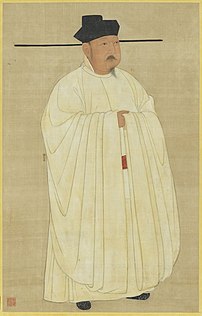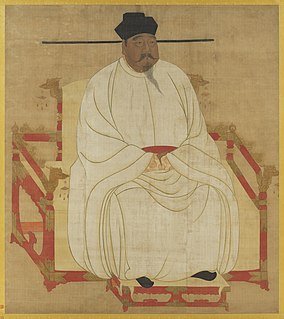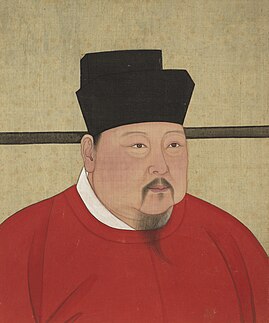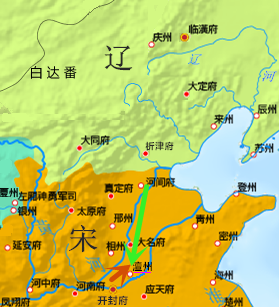
The Five Dynasties and Ten Kingdoms period (907-979) was an era of political upheaval in 10th-century Imperial China. Five states quickly succeeded one another in the Central Plain, and more than a dozen concurrent states were established elsewhere, mainly in South China. It was the last prolonged period of multiple political division in Chinese imperial history.

The Northern and Southern dynasties was a period in the history of China that lasted from 386 to 589, following the tumultuous era of the Sixteen Kingdoms and the Wu Hu states. It is sometimes considered as the latter part of a longer period known as the Six Dynasties. Though an age of civil war and political chaos, it was also a time of flourishing arts and culture, advancement in technology, and the spread of Mahayana Buddhism and Daoism. The period saw large-scale migration of Han Chinese to the lands south of the Yangtze. The period came to an end with the unification of all of China proper by Emperor Wen of the Sui Dynasty.

Zhao Jiong, known as Zhao Guangyi from 960 to 977 and Zhao Kuangyi before 960, also known by his temple name Taizong after his death, was the second emperor of the Song dynasty in China. He reigned from 976 to his death in 997. He was a younger brother of his predecessor Emperor Taizu, and the father of his successor Emperor Zhenzong.

Emperor Taizu of Song personal name Zhao Kuangyin, courtesy name Yuanlang, was the founder and first emperor of the Song dynasty in China. He reigned from 960 until his death in 976. Formerly a distinguished military general of the Later Zhou dynasty, Emperor Taizu came to power after staging a coup d'état and forcing Emperor Gong, the last Later Zhou ruler, to abdicate the throne in his favour.

Emperor Qinzong of Song, personal name Zhao Huan, was the ninth emperor of the Song dynasty in China and the last emperor of The Northern Song Dynasty.

Emperor Gaozong of Song, personal name Zhao Gou, courtesy name Deji, was the tenth emperor of the Song dynasty in China and the first emperor of the Southern Song dynasty.

Emperor Lizong of Song, personal name Zhao Yun, was the 14th emperor of the Song dynasty in China and the fifth emperor of the Southern Song dynasty. He reigned from 1224 to 1264.
Han Tuozhou was a Chinese statesman of the Southern Song dynasty, chancellor to Emperor Ningzong.
Emperor Zhangzong of Jin, personal name Madage, sinicised name Wanyan Jing, was the sixth emperor of the Jurchen-led Jin dynasty, which ruled northern China between the 12th and 13th centuries. He reigned from 20 January 1189 to 29 December 1208.

The Song dynasty of China was a ruling dynasty that controlled China proper and southern China from the middle of the 10th century into the last quarter of the 13th century. The dynasty was established by Emperor Taizu of Song with his usurpation of the throne of Later Zhou, ending the Five Dynasties and Ten Kingdoms period.

The Liao dynasty, also known as the Liao Empire, officially the Great Liao, or the Khitan (Qidan) State, was an empire in East Asia that ruled from 907 to 1125 over present-day Northern and Northeast China, Mongolia and portions of the Russian Far East and North Korea. The empire was founded by Yelü Abaoji, Khagan of the Khitans around the time of the collapse of Tang China and was the first state to control all of Manchuria.

Yang Yanzhao (楊延昭), named Yang Yanlang (楊延朗) before 1012 and Liu Yanlang (劉延朗) before 979, was a military general in ancient China's Northern Song Dynasty. For over 2 decades he defended Song's northern border against the Khitan-ruled Liao Dynasty, helping Song thwart Liao's repeated invasion attempts between 999 and 1004.

The Jin–Song Wars were a series of conflicts between the Jurchen Jin dynasty (1115–1234) and Han Chinese Song dynasty (960–1279). In 1115, Jurchen tribes rebelled against their overlords, the Khitan Liao dynasty (907–1125), and declared the formation of the Jin. Allying with the Song against their common enemy the Liao, the Jin promised to return to the Song the Sixteen Prefectures that had fallen under Liao control since 938. The Chinese agreed but Jurchens quick defeat of the Liao combined with Song military failures made the Jin reluctant to cede these territories. After a series of negotiations that embittered both sides, the Jurchens attacked the Song dynasty in 1125, dispatching one army to Taiyuan and the other to Bianjing, the Song capital.

The Jin–Song Wars were a series of armed conflicts conducted by the Jurchen Jin dynasty and the Song dynasty in the 12th and 13th centuries. The Jurchens were a Tungusic–speaking tribal confederation native to Manchuria. They overthrew the Khitan Liao dynasty in 1122 and declared the establishment of a new dynasty, the Jin. Diplomatic relations between the Jin and Song deteriorated, and the Jurchens first declared war on the Song dynasty in November 1125.
Zhang Qi, originally named Zhang Min, was a high-ranking Song dynasty official and military general. He was one of the longest-serving ministers during Emperor Zhenzong's reign. He also served the assistant commissioner and commissioner of military affairs from 1025 to 1033 during the regency of Emperor Zhenzong's widow Empress Dowager Liu. He was well trusted by both Emperor Zhenzong and Empress Dowager Liu mainly because he had been their personal servant when all 3 were teenagers.

Zhao Pu, courtesy name Zeping, was a Chinese politician and strategist during the reigns of the first two Song dynasty emperors, who was instrumental in plotting the seizure and consolidation of power for both of them. Despite several crisis in his long career, Zhao Pu was by far the most powerful politician for most of the early Song dynasty, serving as a chief councilor three times for a total of 17 years. He has been praised for his brilliance in foreign and domestic policies which helped shape Song's Confucian outlook for the next 2–3 centuries. A proud Confucian, Zhao Pu is well known for allegedly claiming that he administered the state with "half the Analects". Confucian historians, however, also note his cunning, avarice, as well as ruthlessness towards political opponents like Lu Duoxun and Zhao Tingmei, all self-serving and un-Confucian traits.

The military history of the Northern and Southern dynasties encompasses the period of Chinese military activity from 420 to 589. Officially starting with Liu Yu's usurpation of the Jin throne and creation of his Liu Song dynasty in 420, it ended in 589 with the Sui dynasty's conquest of Chen dynasty and reunification of China. The first of the Northern dynasties did not however begin in 420, but in 386 with the creation of Northern Wei. Thus there is some unofficial overlap with the era of the Sixteen Kingdoms.

Zhang Bangchang, was a puppet ruler of Da Chu and a prime minister of the Song dynasty. He was executed by Emperor Gaozong of Song after he surrendered.























